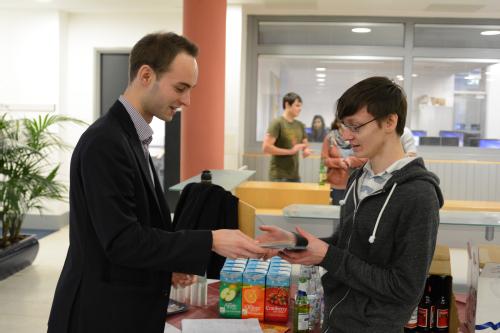Applied Computing News
How to tell if a tweet is telling the truth
How to tell if a tweet is telling the truth, The Times, Pages 1-2, 19 February, 2014.
Information we find through social media cannot always be trusted. A study of social media during the Boston bombing of 2013 concluded that 29% of the most viral content were rumours. This is clearly a major problem and, given the volume – Twitter users send 500 million tweets per day – requires the use of automated techniques to solve it. Research has already identified a number of tell-tale features in the digital ‘signatures’ of social media postings and the sources that produce them that are correlated with trustworthiness. These include posting history and connections with other social media users. The Pheme project, a new £3.5M European Union funded research project involving Computer Scientists from the University of Warwick, will build on this research and will also develop ways to analyse topics in postings, their consistency with other sources and distinguish the different ways in which social media users respond to them.
By combining these different approaches, Pheme will create computer tools with improved ability to discriminate between trustworthy and untrustworthy sources and with the capacity to process the large volumes of information circulating in social media daily. These tools will be made widely available for news media, government agencies and community organisations to use. By providing the means to amplify natural self-correction mechanisms in human communication, Pheme will help people to be more confident in assessing the veracity of information they find in social media.
See: http://www.thetimes.co.uk/tto/technology/internet/article4009691.ece
Rob Procter is Professor of Social Informatics in the Department of Computer Science, University of Warwick. He led a multidisciplinary team to work with the Guardian/LSE on the ‘Reading the Riots’ project, analysing tweets sent during the August 2011 riots. This work won the Data Visualization and Storytelling – National/International category of the inaugural Data Journalism Awards sponsored by Google, the 2012 Online Media Award for the ‘Best use of Social Media’. He is a founder member of the Collaborative Online Social Media Observatory (Cosmos), a multidisciplinary group of researchers in England, Scotland and Wales that is building a platform for social media analytics.
Bank of America Merrill Lynch 1st Year Maze Coursework Winners
Friday 6th December 2013 saw the judging and awarding of prizes for the best solutions to this year's 1st year Programming for Computer Scientists module coursework. David Deacon from Bank of America Merrill Lynch was on hand in the afternoon to award the prizes at the celebration party.
There were some outstanding solutions to the 'Robot' Maze problem this year, which involves finding the optimal path through sets of random mazes, some containing loops. As well as solving the problem at hand, some of the candidates ingeniously subverted the Java framework and produced simple games for the users to play!
This year's overall winner was Marcin Pucilowski who used an A* search for the target with a colour overlay to represent the depth of each node in the graph. Well done to Marcin! Second and third placed were Radu Blana and David Richardson. Radu too made an A* search and a snake game if you "get bored" of running on the same maze. David made 2 additional games, a block defender game and a cellular automaton that worked inside the maze. Highly commended were Rayhaan Jaufeerally, Rhiannon Michelmore and Oliver Hamelkijnck. Rayhaan made a multiplayer networked race to the target. Rhiannon also made a snake game which was great fun to play! Oliver made a Dijkstra-based search for the target. The top three winners received Amazon book tokens and all have been invited to the BAML Insight Week events to be run in spring and autumn next year.
Thank you to David Deacon and BAML for sponsoring the event this year and also to all of the Post Graduate markers involved in the one-to-one marking and feedback sessions.
Steven Wright commended for teaching

Steven Wright has been commended for teaching in DCS by the WATEPGR (Warwick Awards for Teaching Excellence for Postgraduate Research students).
Steven is a seminar tutor and teaches laboratory classes in the Department of Computer Science. It is testament to his abilities that he was given the responsibility for organising three sets of lab classes and also entrusted to design and set course assignments. He even took it upon himself to develop additional coursework assignments to further develop the students’ skills after reflecting on his own experiences of the taught courses. As his nominator points out “Steven has invariably won the praise of staff and students for his contributions to teaching, particularly for his exceptional ability to create engaging coursework assignments and software projects”
Steven’s focus for his teaching is on concept discovery and the sharing of ideas in order for students to develop a rigorous understanding of the subject. He firmly believes that by creating a relaxed environment where there is a sense of equality between students and teachers, the students are empowered to ask and answer question and discuss problems in depth.
Steven has had a major impact on the department’s activities with his technical innovations in laboratory teaching. He wrote the software required for students to develop hardware projects using the latest ARM microprocessor technology. This meant that students with no experience in microprogramming were able to engage with the latest technology and gain an understanding of systems engineering principles, whilst those who were more confident could stretch themselves against the challenging projects that Steven has personally designed.

